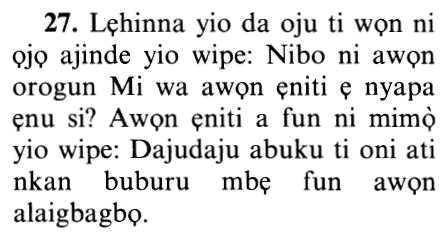16vs27
Select any filter and click on Go! to see results
ثُمَّ يَوْمَ الْقِيَامَةِ يُخْزِيهِمْ وَيَقُولُ أَيْنَ شُرَكَآئِيَ الَّذِينَ كُنتُمْ تُشَاقُّونَ فِيهِمْ قَالَ الَّذِينَ أُوتُواْ الْعِلْمَ إِنَّ الْخِزْيَ الْيَوْمَ وَالْسُّوءَ عَلَى الْكَافِرِينَ
Thumma yawma alqiyamati yukhzeehim wayaqoolu ayna shurakaiya allatheena kuntum tushaqqoona feehim qala allatheena ootoo alAAilma inna alkhizya alyawma waalssooa AAala alkafireena
Click to play
Yoruba Translation

Hausa Translation
Sa´an nan a Rãnar Ƙiyãma (Allah) Yanã kunyatã su, kuma Yanã cħwa: "Inã abõkan tãrayyaTa, waɗanda kuka kasance kunã gãbã a cikin ɗaukaka sha´aninsu?" Waɗanda aka bai wa ilmi suka ce: "Lalle ne wulãkanci a yau da cũta sun tabbata a kan kãfirai."
Asbabu n-Nuzuul (Occasions of Revelation)
ثُمَّ يَوْمَ الْقِيَامَةِ يُخْزِيهِمْ ...
but Allah struck at the foundation of their building, and then the roof fell down upon them, from above them, and the torment overtook them from directions they did not perceive. Then, on the Day of Resurrection, He will disgrace them.
meaning, He will expose their scandalous deeds and what they used to hide in their hearts, and He will bring it out in the open. As He says,
يَوْمَ تُبْلَى السَّرَآئِرُ
The Day when all the secrets will be (exposed and) examined. (86:9)
They will be displayed and made known, as found in the Two Sahihs, where Ibn Umar reported that the Messenger of Allah said:
يُنْصَبُ لِكُلِّ غَادِرٍ لِوَاءٌ يَوْمَ الْقِيَامَةِ عِنْدَ اسْتِهِ بِقَدْرِ غَدْرَتِهِ، فَيُقَالُ: هَذِهِ غَدْرَةُ فُلَانِ ابْنِ فُلَان
On the Day of Resurrection a banner will be set up by his backside for every deceitful person, (whose size is) in accordance with the amount of his deceit. It be said, "This is the one who deceived so-and-so, the son of so-and-so.''
Thus, what they used to plot in secret will be made public. Allah will humiliate them before all of His creation, and the Lord will say to them, in rebuke and reprimand;
... وَيَقُولُ أَيْنَ شُرَكَآئِيَ الَّذِينَ كُنتُمْ تُشَاقُّونَ فِيهِمْ ...
and will say: "Where are My (so-called) partners, those over which you caused so much discord!"
meaning, you fought and made enemies for their sake, so where are they now to help and save you!
هَلْ يَنصُرُونَكُمْ أَوْ يَنتَصِرُونَ
Can they help you or (even) help themselves! (26:93)
فَمَا لَهُ مِن قُوَّةٍ وَلاَ نَاصِرٍ
Then he will have no power, nor any helper. (86:10)
When evidence and proof is established against them, and the Word (of Allah) is justified against them, and they will be unable to give any excuse, realizing that escape is impossible, then;
... قَالَ الَّذِينَ أُوتُواْ الْعِلْمَ ...
Those who have been given the knowledge will say:
who are the leaders in this world and the Hereafter and who know about the truth in this world and the Hereafter - will say,
... إِنَّ الْخِزْيَ الْيَوْمَ وَالْسُّوءَ عَلَى الْكَافِرِينَ ﴿٢٧﴾
Indeed it is a Day of disgrace and misery for the disbelievers.
meaning, today those who disbelieved in Allah and worshipped others who have no power either to benefit or to harm them are now surrounded by disgrace and punishment.
يظهر فضائحهم وما كانت تجنيه ضمائرهم فجعله علانية كقوله تعالى " يوم تبلى السرائر " أي تظهر وتشتهر كما في الصحيحين عن ابن عمر قال : قال رسول الله صلى الله عليه وسلم " ينصب لكل غادر لواء يوم القيامة عند استه بقدر غدرته فيقال هذه غدرة فلان بن فلان " وهكذا هؤلاء يظهر للناس ما كانوا يسرونه من المكر ويخزيهم الله على رءوس الخلائق ويقول لهم الرب تبارك وتعالى مقرعا لهم وموبخا " أين شركائي الذين كنتم تشاقون فيهم " تحاربون وتعادون في سبيلهم أين هم عن نصركم وخلاصكم هاهنا ؟ " هل ينصرونكم أو ينتصرون " " فما له من قوة ولا ناصر " فإذا توجهت عليهم الحجة وقامت عليهم الدلالة وحقت عليهم الكلمة وسكتوا عن الاعتذار حين لا فرار " قال الذين أوتوا العلم " وهم السادة في الدنيا والآخرة والمخبرون عن الحق في الدنيا والآخرة فيقولون حينئذ " إن الخزي اليوم والسوء على الكافرين " أي الفضيحة والعذاب محيط اليوم بمن كفر بالله وأشرك به ما لا يضره وما لا ينفعه .
"ثم يوم القيامة يخزيهم" يذلهم "ويقول" الله لهم على لسان الملائكة توبيخا "أين شركائي" بزعمكم "الذين كنتم تشاقون" تخالفون المؤمنين "فيهم" في شأنهم "قال" أي يقول "الذين أوتوا العلم" من الأنبياء والمؤمنين "إن الخزي اليوم والسوء على الكافرين" يقولونه شماتة بهم
أي يفضحهم بالعذاب ويذلهم به ويهينهم
I'raab - grammatical analysis of the Qur'an
«ثُمَّ» عاطفة.
«يَوْمَ» ظرف زمان.
«الْقِيامَةِ» مضاف إليه.
«يُخْزِيهِمْ» مضارع مرفوع بالضمة المقدرة على الياء للثقل والهاء مفعول به والفاعل مستتر والجملة معطوفة.
«وَيَقُولُ» مضارع فاعله مستتر والجملة معطوفة.
«أَيْنَ شُرَكائِيَ» شركائي مبتدأ مؤخر والياء مضاف إليه وأين اسم استفهام في محل نصب ظرف مكان متعلق بالخبر المحذوف المقدم والجملة مقول القول.
«الَّذِينَ» اسم موصول في محل رفع صفة لشركائي.
«كُنْتُمْ» كان واسمها.
«تُشَاقُّونَ» مضارع مرفوع بثبوت النون والواو فاعل والجملة خبر كان.
«فِيهِمْ» متعلقان بتشاقون.
«قالَ» ماض وفاعله والجملة مستأنفة.
«الَّذِينَ» اسم موصول فاعل.
«أُوتُوا الْعِلْمَ» ماض مبني للمجهول والواو نائب فاعل والعلم ومفعوله والجملة صلة.
«إِنَّ الْخِزْيَ» إن واسمها.
«الْيَوْمَ» ظرف زمان متعلق بالخزي.
«وَالسُّوءَ» معطوف على الخزي.
«عَلَى الْكافِرِينَ» متعلقان بالخبر والجملة مقول القول.
